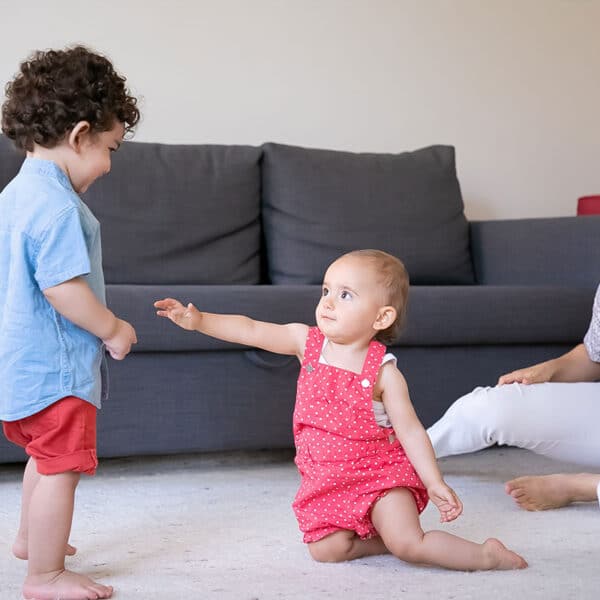Teaching good behavior is an important part of raising a child. Good behavior will help them succeed in life, and they will become responsible citizens of the country. Many children face various problems growing up because they do not know basic manners. Every stage of their life is affected by this. Manners should ideally be taught in schools, but in reality, schools do not place much emphasis on this. The family can be the place where these behaviors are learned.
Before knowing the behaviors, it’s important to understand how to teach them to children. Jodi R. R. Smith, the founder of Manners Consulting in the United States, offers five simple steps. Let’s start with these suggestions:
- Practice at Home: Prepare children at home for various situations so they don’t feel uncomfortable when they are outside.
- Set Age-Appropriate Expectations: Understand what your child can learn or do at each stage of life. Many parents do not realize what their children are capable of if given the opportunity.
- Set a Good Example: Children are very imitative. They will try to do what they see you do. So, pay attention to your own behavior. Even if you think your children are not watching, you should still be mindful of your actions.
- Avoid Threats or Punishment: Many children misbehave during their childhood. Explain things to them calmly. If you get angry or punish them, they may view you negatively and may not listen to you.
- Always Communicate with Your Child: Children have many questions in their minds. At this age, they are very curious. Treat them in a way that makes them feel you are the right person to ask their questions. Make sure they feel comfortable approaching you without fear.
 Designed by Freepik
Designed by Freepik
“Now, let’s find out which behaviors you must teach your child. These often-forgotten behaviors can brighten your child’s future.”
1. Teach When to Turn Off the Phone
Adeodata Czink, founder of the Canada-based company Business of Manners, says, “Most children, even at a very young age, have their own smartphones. Others use their parents’ phones. Therefore, as they grow up, they need to be taught proper phone etiquette. It’s important to teach children when to turn off the phone or put it on silent mode. For example, phones should not be used in religious institutions, educational settings, movie theaters, or during meetings.”
2. Teach Good Behavior Them to Say ‘You’re Welcome’
When speaking with someone, children should use the words ‘please’ and ‘thank you.’ It’s also important to teach them how to respond when someone thanks them. Many children respond with phrases like ‘no problem,’ ‘anyway,’ or ‘okay,’ but don’t reply when someone thanks them. To properly respond to thanks, it’s necessary to use phrases like ‘you’re welcome’ or ‘my pleasure.’
3. Teach Them to Do Small Acts of Service
Children can easily perform small acts of service, such as closing an open door, picking up something that has fallen, or letting someone go ahead in line. These behaviors influence their development and ensure their growth in the future. Sometimes, children can help other children or even adults, but it’s important to teach them these behaviors under the guidance of a known adult. They should not be forced to act this way with unfamiliar adults.
4. Teach Them to Thank Service Workers
One of the most important polite behaviors is saying ‘thank you.’ However, nowadays, not only children but also many adults don’t thank bus drivers, restaurant waiters, house help, office assistants, or security guards. Some even look down on them. But they help us every day. It’s not just a matter of courtesy; it’s about recognizing the value of everyone’s work. Therefore, they should be thanked.
 Designed by Freepik
Designed by Freepik
5. Teach Them to Offer Their Seat to Others
Generally, one should give up their seat for pregnant women or elderly people on the bus. However, nowadays, many parents prioritize their own child’s comfort over others. As a result, even if elderly people are standing, children occupy seats. Often, even as they grow up, they don’t learn this courtesy. Unless the child is sick or very young, they should be taught this behavior. It’s a great opportunity to teach them empathy and consideration for others.
6. Teach Them to Wait Until Everyone Is Served Before Eating
Whether at home or in a restaurant, it’s not always possible to serve everyone at once. Some may receive their food a bit earlier, and others a bit later. So, teach your child to be patient until all the food is ready. Instead of starting to eat immediately when served, they should wait for others. Eating together has its own special joy.
7. Teach Them Not to Speak Loudly
Many children shout or speak loudly wherever they are, which can be annoying for those around them. Some even laugh or cry loudly without considering the situation. Therefore, every parent should teach their child to understand the situation and speak accordingly. You can turn this into a fun game for them. For instance, in a movie theater, you could play a game to see who can whisper the most quietly. By treating it as a game, children can learn to speak softly and politely.
8. Teach Them to Take Turns When Speaking
Sometimes, when children start talking, they don’t stop. It’s also common for a child to interrupt when adults are speaking. In such cases, children need to be taught patience. Even if they resist, don’t scold them. Explain things calmly and teach them that interrupting a conversation is rude. Assure them that you will listen to everything they want to say afterward.
9. Teach Them to Be Polite Behavior
Many children make sudden comments about people. For example, they may ask why someone has acne on their face or why an uncle is bald. This can make others uncomfortable. Children need to learn that their words can affect others. If they are curious about something, they should wait instead of asking directly. They should not comment on anyone until that person shares something personal themselves.
10. Teach Them to Cover Their Mouth When Sneezing or Coughing
It’s important to teach children to cover their mouth with a tissue, hand, or elbow when sneezing or coughing. This is not just about health etiquette; it’s about courtesy. Germs can spread to others when someone sneezes or coughs, and the person next to them may not appreciate it. So, teach your child to cover their mouth when they cough and say ‘excuse me’ or ‘pardon me’ if they sneeze or cough in front of someone.
11. Teach Them to Write Thank-You Notes or Texts
People who give gifts often like to know that their gift was received and appreciated. Children should be taught to write or draw thank-you cards when they receive a gift. Another modern way is to send a message or email saying ‘thank you.’ You could also take a picture of your child with the gift and send it to the gift giver.
12. Teach Social Media Etiquette
Nowadays, many children spend a lot of time on social media, where they make many online friends. It’s important to teach them what they should and shouldn’t do on social media. While social media might be a private space for your child, they should understand some basic rules. For instance, what type of photos to post or seeking permission before posting someone else’s picture are important considerations. They should never share personal information online that they wouldn’t share in person.
13.Teach Them How to Greet Others
Many children feel hesitant when talking to unfamiliar people. It’s important to teach them how to greet people politely when meeting someone new. The ideal way to introduce themselves is to make eye contact first, then shake hands with a warm smile. This applies to both children and adults. However, if a child is not comfortable shaking hands or touching another child, they can nod their head in greeting.
14. Arriving on Time Good Behavior
Children should develop the habit of arriving on time for any place or event. This will not only make them aware of the importance of time but also increase their respect for their peers, teachers, and family members.
15. Caution Them About Phone Etiquette
There is no doubt that the new generation is very skilled in using smartphones. However, older people usually display better behavior when talking on the phone. The most concerning issue is that many children are not aware of phone etiquette. They often say “hello” and then stay silent, or they may hold the phone to their ear with one hand while playing computer games or watching TV with the other, making them inattentive. Therefore, it is important to teach children how to carry on a conversation when someone calls. They should learn how to start a conversation after picking up the phone, introduce themselves, and continue the conversation in turn.











